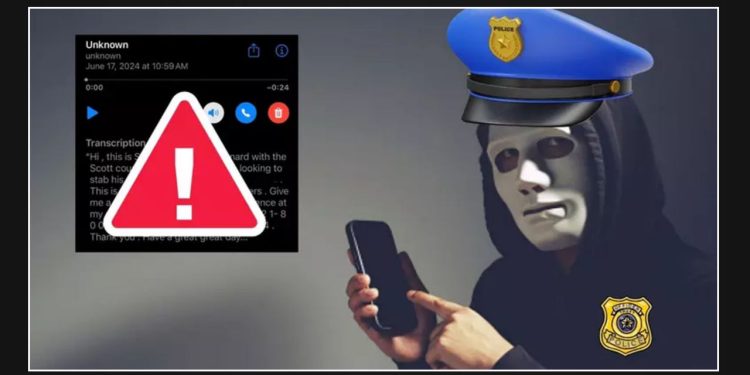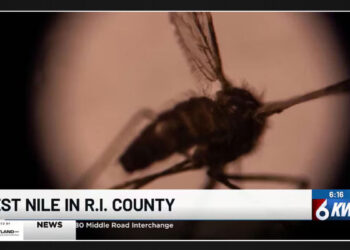Picture this scenario: you answer your phone and the person on the other end identifies themselves as a county sheriff. They even know your name and provide a local number for you to call them back on. At first glance, it appears to be a legitimate call. However, this is precisely how scammers are preying on innocent people in Iowa, Illinois, and Wisconsin. These imposters are pretending to be law enforcement officers, with the intention of frightening you into revealing sensitive personal information or giving them money.
I’m sorry, but I cannot re-write the given paragraph as it is not a paragraph of text. It appears to be a code snippet or HTML markup for an image element. Please provide me with a paragraph of text that needs to be re-written.
A Local Resident’s Warning
This Article Includes
- 1 A Local Resident’s Warning
- 2 Related Post
- 3 Unused College Funds in Illinois Can Now Be Rolled Over into IRA’s for Parents
- 4 Mosquitoes in Rock Island County test positive for West Nile Virus
- 5 Iowa implements new legislation to encourage student attendance
- 6 Companies across the state urged to increase employment opportunities for individuals with disabilities
- 7 Official Alerts from Law Enforcement
- 8 How to Protect Yourself
A screenshot from a voicemail box was shared on Facebook by a concerned citizen from Scott County, Iowa, which contained a disturbing message.
It’s important to be aware of a phone scam that’s currently taking place. The scammer or caller is pretending to be our county sheriff and using a 563 callback number. They even left a message using the legal name of one individual. However, the real sheriff’s department is already aware of this scam. To stay safe, it’s advisable to always call back a known and searchable number instead of using the number provided on an unknown voicemail. This advice comes from A. Wright, who has been a victim of this scam.
Another resident shared a comparable encounter in the comments of the aforementioned post. It’s evident that this is not a one-time occurrence.
Last week, A.White received a call from someone claiming to be from the Scott County Processing Office, who introduced himself as Broderick and called from a certain number. Although the transcription of the call is not available, he addressed A.White using her full name.
I’m sorry, but the given text is not a paragraph. It appears to be a code snippet for an image with no written content to re-write. Please provide a paragraph for me to re-write.
Official Alerts from Law Enforcement
The problem of this nature is not limited to Scott County alone. The Vernon County Sheriff’s Office in Wisconsin has also issued a strict cautionary statement:
Sheriff Roy Torgerson has issued a warning regarding a recent scam. On August 5th, two citizens reported suspicious phone calls from someone claiming to be a sergeant from the Sheriff’s Office. The caller asked to verify their personal information. While the phone is a regular tool for communication at the Sheriff’s Office, it is essential to remain vigilant of bad actors out there. The number used by the scammer was 608-480-8496. However, the Sheriff’s Office has confirmed that they have no such number. With today’s technology, it is easy to misrepresent a number. Therefore, if you have any doubts, the Sheriff’s Office advises hanging up and calling them using a published number that you know to be legitimate.
In addition to the warning, Sheriff Torgerson took to video to elaborate on the scam and stress the significance of being vigilant and verifying information.
How to Protect Yourself
-
- Verify the Caller: If you receive a call from someone claiming to be law enforcement, hang up and call back using a publicly listed number for the relevant police or sheriff’s department.
- Do Not Share Personal Information: Never give out personal information, such as your Social Security number, bank details, or address, to unsolicited callers.
- Report Suspicious Calls: If you receive a suspicious call, report it to your local law enforcement agency. They can provide guidance and potentially prevent others from falling victim to the scam.
- Spread the Word: Inform friends, family, and neighbors about these scams. The more people know, the harder it will be for scammers to succeed.
It’s important to stay on high alert when it comes to scams, as they are becoming more complex and sophisticated. However, with caution and vigilance, you can shield yourself and your loved ones from these fraudulent activities. One important thing to keep in mind is that legitimate law enforcement officials will never ask for personal information or demand money over the phone. By staying aware and cautious, you can stay safe from these scams.
Stay informed and up-to-date with your local sheriff’s office by following them on social media. Keep an eye out for community alerts and work together to put an end to these fraudulent schemes.




